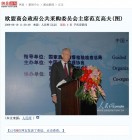See here the full text of an interview published by China Daily on 9 May. Excellent overview and overall my own position on the matter. Joerg remains diplomatic but clearly indicates there are some worrying trends. As chairman of the EUCCC Working Group “Public Procurement” I look very much into issues of market access and since years China has been very good at keeping out EU companies whenever it feels so – despite all the lip service and denials.
Chamber head: China will ‘bottom out’ this quarter
By Wang Xin (China Daily)
China’s economic downturn will bottom out in the second quarter of this year, according to Jörg Wuttke, president of EU Chamber of Commerce in China.
“But whether the recovery line will be the shape of a ‘V’ or ‘W’ is not known,” he added.
He cited heavy government-led investment in fixed assets, abundant lending by major State-owned banks and rising stocks bolstering confidence as reasons for his optimism.
Yet he said he is unsure of whether or when a second bottom might be felt in China because the global economy will not recover so soon.
What he is sure of is that the markets in the United States and the European Union are shrinking dramatically.
“The worst is not over yet,” said Wuttke echoing Chinese Vice-Premier Wang Qishan.
While China is struggling to maintain continuing growth, seeking to realize a 7 to 8 GDP percent increase, Germany – the biggest economy in Europe and also the homeland of the chamber president – has dropped by 5 percent, contributing significantly to an overall decline on the continent, Wuttke said.
So Europe will contract this year, not to mention the epicenter of the recession, the US.
“If US and Europe are lucky next year they will not go down but go flat,” Wuttke said. “And that is, if we are lucky enough.”
“China cannot wait until Europe and US come back, because they will come back too late,” Wuttke said. “Chinese exporters have to understand that the good times of big US and Europe buying are over.”
Instead of waiting for others to pull it out, China has to depend on itself by stimulating domestic consumption, restructuring its economy and shifting the growth pattern, he said.
Wuttke predicted that China will over the next five or 10 years turn from a supply-side economy producing for the world to a demand economy that will consume more and have stronger import growth.
The “timely, big and broad” stimulus package China’s government announced last November targets comparatively weak infrastructure in areas such as railways and has already had an impact on the economy.
Being “part of China” – as the president of EU Chamber of Commerce repeatedly stressed – European-funded companies “have been hit as China has been hit and got stronger as China feels the results of economic stimulation”, Wuttke noted.
Companies in the sectors related to infrastructure construction such as cement, steel, building materials, rails and trains have benefited enormously from the package.
Wuttke suggested more investment should be made in what he called “soft areas” like education, healthcare and pensions, rather than in “unnecessary additional hard infrastructure”. “When people feel safe, they become more ready to spend,” he said, though he noted expanding a social security network is a time-consuming task.
Low-income people should be the target of the stimulus plan, he said, as the poor tend to spend more as they need more, while the rich probably choose to save more.
In addition to spurring domestic demand, China is also extending a hand to help other nations revive.
Commenting on a string of visits of Chinese trade delegations around Europe, Wuttke said he agreed with Chinese Premier Wen Jiabao that they are confidence-building tours.
Despite the limited impact on trade figures, the purchase groups have showed a gesture of goodwill, he noted. “In contrast to US conservative efforts, China is buying from us.”
“China is virtually the only big economy that is still growing. Of course everybody is trying to gain a standing in it.”
For European-funded companies, the Chinese market itself is now the focus as it is no longer just a manufacturing base for exports, Wuttke said.
However, as some of the European ventures serve Chinese exporters, indirectly they were also hit badly in the foreign trade collapse, he added.
Even worse, with heightened pressure from the crisis, protectionism is markedly rising.
Protectionism, “the ugly sister of recession”, results in distortion of market conditions, Wuttke said. Such short-sighted thinking has a long-range bad impacts, he pointed out.
“It is politically easy to do”, but as a whole, it makes business more expensive, disrupts supply chains and results in consumers paying higher prices with fewer choices, which in turn causes people less willing to consume and actually delays economic recovery, he said.
“Protectionism has obviously proved to be a disaster, but is hard to avoid, especially during a slowdown, unfortunately.”
Currently no severe protectionism is looming yet “there are such tendencies,” he said.















